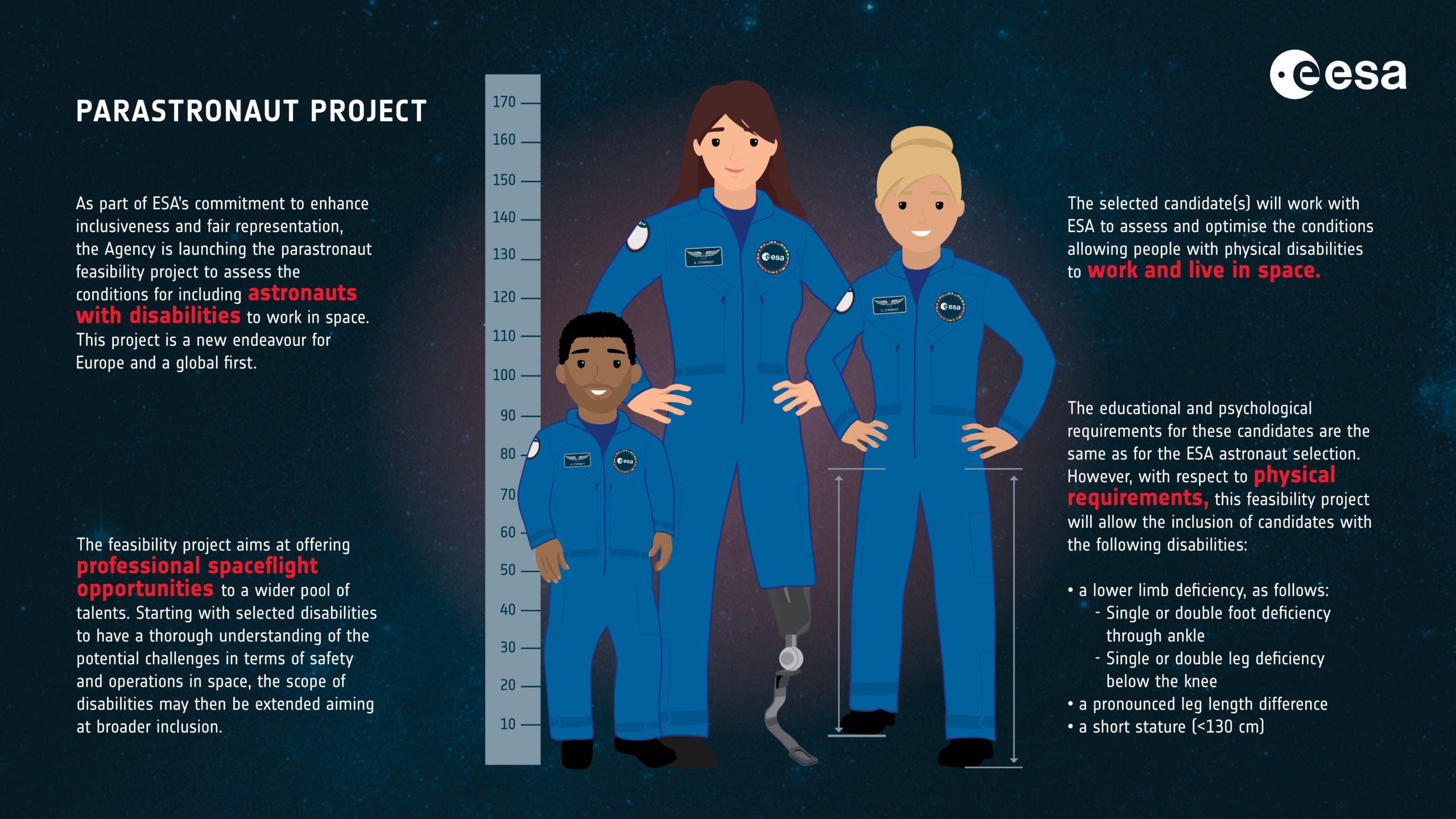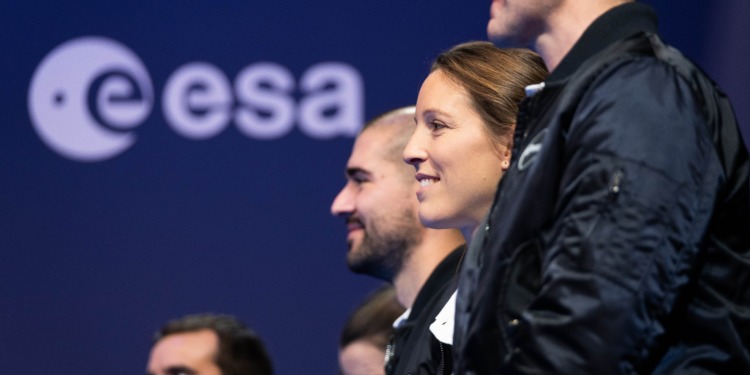John McFall is a trailblazer of sport, science, and now, space. He is a decorated bronze medal Paralympic athlete, a Trauma and Orthopedic surgeon, and most recently, the European Space Agency’s first Parastronaut. He’s also a carpenter, keen mountain biker, plays the guitar, and is married with three children – correction, he’s a trailblazer of life.
At the young age of 19, McFall lost his leg in a motorcycle accident, but his devotion to running and mountain biking pushed him to learn to run again.
This passion for exercise and movement didn’t stop there though. McFall went on to gain bachelor’s and master’s degrees in sports science, which he then took one step further in becoming a professional athlete, later representing the UK as a Paralympic sprinter. In 2008, McFall won the 100m bronze medal in the Beijing Paralympics.
Six years later, McFall graduated again, this time with a degree in Medicine and Surgery, and went on to join the Royal College of Surgeons as a Fellow, working as a Specialist Registrar and orthopedic surgeon in the UK.
Rather than obstacle, it seems that for John McFall, challenge and adversity are synonyms for opportunity.
One such opportunity – a big one – arose for McFall earlier this month, when he was selected for ESA’s Parastronaut Feasibility Project; an initiative aiming to improve the agency’s understanding of “the barriers space flight presents for astronauts with a physical disability,” and to help overcome them.
“As an amputee… I never thought that being an astronaut was a possibility,” admits McFall, adding that he “can bring inspiration.”
“Inspiration that science is for everyone,” he says, but also that, “potentially, space is for everyone.”
Redesigning spaceflight architecture
With this Parastronaut Feasibility Project, ESA aims to define what kind of hardware adaptations spacecraft might require to make them accessible and safe for physically disabled individuals. These individuals may be entirely “psychologically, cognitively, technically and professionally qualified” to go into space, but logistically would normally not meet the stringent selection criteria imposed by the existing architecture of spaceflight.
“Right now we are at step zero. The door is closed to persons living with disabilities. With this pilot project we have the ambition to open this door and make a leap, to go from zero to one,” says the space agency candidly.
If the feasibility project is successful, John McFall’s voyage into space as a physically disabled astronaut will be a first for ESA, but also for the world and the history of human spaceflight as a whole.

ESA’s transparent approach to recalibrating the parameters of spaceflight to accommodate a broader spectrum of brilliant people, is both refreshing and impressive – and so is their honesty.
“What needs to happen for an astronaut with a physical disability to fly?” ask ESA, openly admitting that at this time there are many unknowns.
“However, it takes courage to start,” they say, “to make the first step, and that is what we are doing today.”
Related Articles: Climate Change on Mars: How Ancient Alien Life May Have Triggered Their Own Extinction | Are We Alone? NASA Begins New UFO Research | Aliens on Mars? NASA Discovers Signs of Ancient Life | Space Cooperation with Russia in Jeopardy
The project has an initial budget of €1 million, but the agency has openly stated that the true cost of a “very innovative project” such as this is difficult to estimate due to the significant degree of unknown variables. They have also disclosed that they lack some degree of in-house expertise, stating they will require external collaboration.
“There are many unknowns ahead of us, the only promise we can make today is one of a serious, dedicated and honest attempt to clear the path to space for a professional astronaut with a physical disability,” say ESA, also noting that “along the way, [the project] will bring innovations and other benefits to the safety and efficiency of future crews.”
“If there is one thing we have learned by working on the International Space Station (ISS), it is that there is great value in diversity. Including people with special needs also means benefiting from their extraordinary experience, ability to adapt to difficult environments, and point of view,” explain ESA.
After almost a decade of no recruitment, this program is just one part of a larger collection of diversity driving initiatives from ESA, which though still mostly only in pilot phases, show that the agency’s perspective on progress and the power of inclusion is progressive.
Embracing a new era of space exploration
Under the four pillars of “Inclusiveness,” “Responsibility,” “Leading by example” and “Learning from our differences,” ESA are embracing a next-generation recruitment strategy solely dedicated to expanding representation in their astronaut crew, stating:
“At ESA, diversity is an asset.”
We are honoured to introduce you to the new generation of ESA astronauts 👨🚀👩🚀 #ESAastro2022
In this new class of 2022 astronauts are five career astronauts, 11 members of the astronaut reserve and one astronaut with a disability.
👉 https://t.co/ATzVSSXirj pic.twitter.com/yS82vtX8VQ
— ESA (@esa) November 23, 2022
The agency has publicly stated they believe “exploration is the matter of a collective effort,” one that requires the pool of talent to be expanded to “more gifted people of different genders, ages and backgrounds,” specifically encouraging more women to apply for the one of the few coveted spots on the shortlist.
In ESA’s last recruitment drive in 2008, only one woman was selected. Similarly, only one out of the seven ESA astronauts that are currently spaceflight ready is a woman; Italian astronaut Samantha Cristoforetti.
Explaining “Why now?” ESA states:
“In the decade since the last selection of ESA Astronauts in 2008-09, the expectations of society towards diversity and inclusivity have changed. The high cost of the human spaceflight programme (which is funded by European taxpayers) means that ESA cannot and does not want to ignore these changes.”
This year, almost half of ESA’s new cohort of astronauts – eight out of 17 – are women.
Breaking boundaries. Empowering girls. Launching futures 🚀
For #WorldSpaceWeek, and as part of @Barbie and ESA’s joint mission of #InspiringGirls to consider careers in #STEM, ESA's @AstroSamantha answered questions from girls from space! Thanks, @Inspiringgirlsf! pic.twitter.com/lIvvOa1xkI
— ESA (@esa) October 4, 2022
ESA did also note however that there is still a lack of ethnic diversity amongst successful applicants, and have demonstrated accountability and commitment to addressing why this underrepresentation has occurred, as well as what the agency can do to change it next time.
“Fair representation of all parts of society is a high focus of action for governments, institutions and business alike… ESA needs and wants to embrace change in order to remain relevant and accessible, especially to younger generations,” states the agency.
ahhh look what arrived from @esa 😍🏳️🌈 #LGBTQSTEMDay pic.twitter.com/ZTEelaxCBI
— Dr Sam Rowe (@samfrowe) November 14, 2022
Diversity and inclusion is in focus, and as a result we possibly face virtue-signals from many well-intentioned organizations who may be talking the talk, but potentially not fully walking the walk.
However, after appointing McFall, as well as a remarkably gender-balanced cohort of new astronauts, ESA are walking the walk.
Demonstrating this commitment, last month they launched a new set of concrete initiatives, intentions and actions to advance ESA diversity.
ESA’s “Eight Steps Forward:”
- Aim to have at least 40% recruitment of women by 2025.
- Make ESA’s commitment to a gender-balanced workforce visible.
- Strive to ensure gender diversity in evaluation panels and in other relevant advisory bodies, such as conferences, boards, and expert groups.
- Increase the number of new recruits with disabilities.
- Remove physical barriers.
- Ensure a work environment where staff can be comfortable and confident in their identity.
- Strive to reduce the average age of recruitment at ESA.
- Secure the leadership team’s support for enhancing diversity & inclusiveness at the workplace and ensure that they communicate internally and externally ESA’s commitment to progress.
@esa is taking 'Eight Steps Forward' to further advance #Diversity and #Inclusiveness, with a set of concrete initiatives and actions 🚀
Find out more 👉 https://t.co/jECrfoMjmw
Our 8 Steps 🧵👇 1/10 pic.twitter.com/295001JYiD
— ESA Diversity (@ESADiversity) October 6, 2022
The agency hopes that this pioneering program will set the standard for the future of spaceflight, encouraging other international partners to also embrace inclusion and diversity on a wider scale in their space programs.
NASA have also shown progress in diversity and inclusion lately, with the recent announcement of their plans to land the first woman and person of color on the moon as part of their Artemis missions, of which after several false starts, the first was successfully launched on November 16.
ESA’s Class of 2022
On Wednesday this week at the Grand Palais Éphémère in Paris, ESA Director General Josef Aschbacher revealed and introduced the agency’s Class of 2022 “new generation of astronauts;” 17 exceptional candidates (including John McFall) from over 22,500 applicants from across all of the agency’s 22 member states. These will be the first new recruits in 13 years.
Five of the candidates are career astronauts, and another 11 are reserve astronauts who will step up as required. John Mcfall is the only parastronaut.
The space family grows!👩🏼🚀👩🏻🚀👩🏽🚀👨🏽🚀👨🏻🚀
Welcome to the 17 members of the new @ESA astronaut class 2022, bringing ambition, talent and #diversity on board 🎉🚀
Learn more about ESA's class of 2022 #astronauts here👉 https://t.co/FiXlD4MLwH pic.twitter.com/U3MgReJ8gI— ESA Diversity (@ESADiversity) November 24, 2022
“This ESA astronaut class is bringing ambition, talent and diversity in many different forms – to drive our endeavors, and our future,” says ESA.
Of the 17 selected, three of ESA’s new astronauts (including McFall) are British.
Science and Space Minister @GeorgeFreemanMP spoke to the new UK @ESA astronauts announced yesterday at #CM22 in Paris. 👨🚀👩🚀👨🚀
Hear about the journey of Rosemary Coogan, the UK’s third ever astronaut. 👩🚀👇#ESAastro2022 #UKinESA pic.twitter.com/mC6LFPJVYl
— UK Space Agency (@spacegovuk) November 24, 2022
Until now, there has only been one ESA astronaut from the UK, Tim Peake, who was selected to join the agency in 2008. Upon hearing the announcement, Peake hailed the agency’s recruitment of John McFall as “absolutely groundbreaking,” adding that “[h]e’s really going to be pushing the boundaries,” as well as “paving the way for astronauts with future disabilities to do so as well.”
Well this has to be a first – four British @esa astronauts together! A great result for the #UK and continued cooperation with our European partners in human spaceflight 👏👏👍🚀 pic.twitter.com/QZMmlqZssE
— Tim Peake (@astro_timpeake) November 23, 2022
Of the other 14 recruits, eight are from France, Spain, Italy, and Germany (two from each), while the remaining six come from Belgium, Austria, Switzerland, Czech Republic, Poland, and Sweden (one from each).
The recruits will soon travel to the European Astronaut Centre in Cologne, Germany, where they will begin a grueling 12-month basic training program, after which they will move forward to Space Station and mission-specific training.
“This is an extraordinary time for human spaceflight and for Europe,” says ESA Director of Human and Robotic Exploration, David Parker. “We are on the forefront of human space exploration” he stated, adding that ESA are “delighted to have this group of extremely talented people, to continue European science and operations on the International Space Station and beyond.”
— —
Correction: This article has been updated since publication to amend the mention of skills considered in selection criteria, and to include the full quote in relation to ESA’s explanation of “Why now?”
Editor’s Note: The opinions expressed here by the authors are their own, not those of Impakter.com — In the Featured Photo: ESA astronaut announcement Class of 2022. Featured Photo Credit: Sebastiaan ter Burg/Flickr










